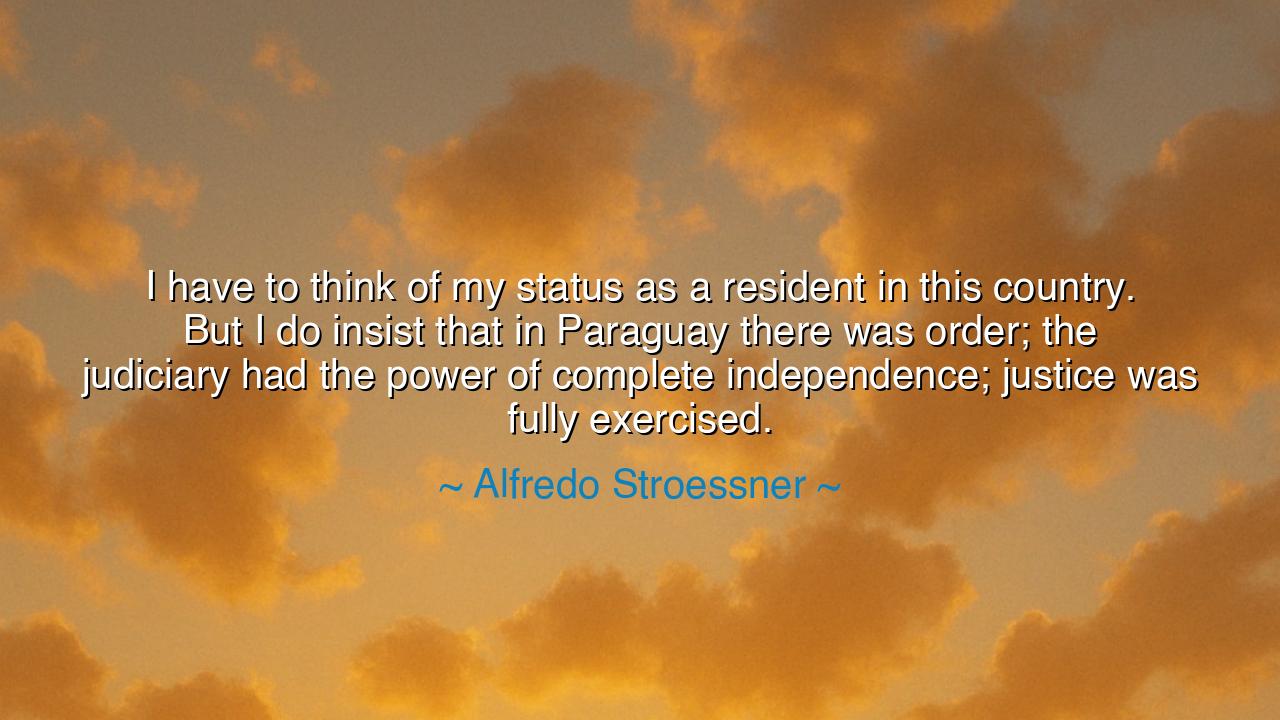
I have to think of my status as a resident in this country. But I
I have to think of my status as a resident in this country. But I do insist that in Paraguay there was order; the judiciary had the power of complete independence; justice was fully exercised.






When Alfredo Stroessner said, “I have to think of my status as a resident in this country. But I do insist that in Paraguay there was order; the judiciary had the power of complete independence; justice was fully exercised,” he was not simply recalling his rule — he was defending his legacy through the lens of memory and self-justification. Spoken after his long exile from Paraguay, this statement reveals the eternal struggle of power and conscience: how rulers remember their reigns, and how history remembers them. Stroessner’s words are an echo of a man who, once absolute, now stood as a shadow of his former might, seeking to wrap authority in the cloth of legitimacy.
The origin of this quote comes from the twilight of Stroessner’s life, long after he was overthrown in 1989. For thirty-five years, he ruled Paraguay with an iron hand, from 1954 to 1989 — one of the longest-lasting dictatorships in Latin America. His regime prided itself on order, discipline, and control, yet it was marked by censorship, political repression, and secret imprisonment. When Stroessner spoke of “complete independence of the judiciary,” he was crafting a vision of his Paraguay not as a dictatorship, but as a state of stability — an ordered world where institutions, at least in his mind, functioned harmoniously under his guidance. His insistence reveals how those who hold absolute power often confuse obedience with order, and fear with peace.
In these words, we hear the old refrain of rulers throughout history — from emperors of Rome to modern autocrats — who, when stripped of power, cling to the illusion that their reigns were righteous. Like Marcus Aurelius, Stroessner might have believed himself a guardian of civilization, though his “civilization” was built upon silence. Yet the tone of his defense is not only pride but exile’s sorrow. The phrase “I have to think of my status as a resident in this country” shows the bitter humility of a man once feared by millions, now reduced to a foreigner in the twilight of his life. Power had slipped from his hands, and so he held instead to the only thing that remained — the memory of control.
But beneath his words lies a deeper human truth. Even tyrants, when they fall, yearn for justification — to believe that the suffering under their rule had purpose, that their reigns were not vain. History is filled with such voices. Napoleon Bonaparte, in exile on St. Helena, wrote endlessly of his vision for Europe, seeking to cloak conquest in destiny. King Lear, stripped of his throne, raged at the storm, crying that he had been a “kind father.” Stroessner’s claim that “justice was fully exercised” carries that same tragic note: a man at the end of his road, trying to rewrite what the world had already judged.
And yet, even in his distortion, there is something to ponder. Stroessner’s words remind us that order without justice is tyranny, and stability without freedom is stagnation. Many leaders have built nations upon fear, believing that peace lies in the absence of dissent. But as history teaches, such peace is brittle — like glass that shatters at the first blow of truth. True independence of the judiciary, which Stroessner claimed to have upheld, exists only when it can rule against power, not serve it. His assertion, therefore, is less a reflection of Paraguay’s past than a warning to the future: when rulers praise order too loudly, it often means freedom has been silenced.
Consider Augustus Caesar, who brought “peace” to Rome after decades of civil war — yet that peace was bought with the death of the Republic. The people called it the Pax Romana, the peace of Rome, but it was a peace guarded by legions and decrees. So it was in Stroessner’s Paraguay: a “peace” maintained by control, a “justice” administered by fear. To the powerful, such systems seem perfect — until they crumble beneath the weight of their own deceit.
So, my children of history, take this lesson to heart: never mistake the stillness of oppression for the harmony of justice. When a man in power speaks too fondly of order, listen for the silenced cries beneath his words. For true order is not the absence of chaos — it is the presence of fairness, mercy, and truth. Stroessner’s reflection, though self-serving, is valuable not for what it claims, but for what it reveals: that even those who ruled through fear wish, in the end, to be remembered as bringers of justice. Let us, then, remember differently — not by their proclamations, but by the freedom or fear they left behind.






AAdministratorAdministrator
Welcome, honored guests. Please leave a comment, we will respond soon